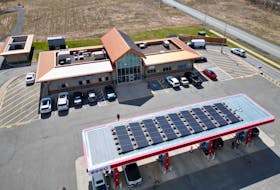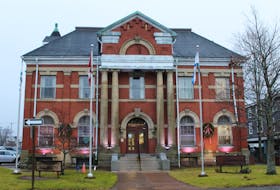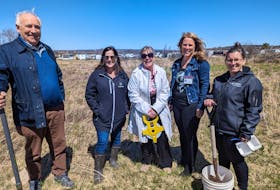Mike Miller felt proud as he lofted a 56 lb solid lead ball 12 feet over a metal bar.
He was one of several athletes competing at the 2018 Colchester Highland Games and Gathering in Truro on Sept. 8-9, a celebration of both sporting prowess and Scottish roots complete with tartan and bagpipes.
“It’s amazing and it feels very prideful doing it and I’m excited when I get to do it every time,” said Miller, who hails from Dalhousie, New Brunswick. “I came from a bodybuilding background and my bloodline is actually Scottish.”
As one of the Maritime Heavyweight Championship athletes, Miller donned a kilt and pulled-up white socks before heading onto the field.
The sportsmen, with bodybuilder physiques like Miller, hurled traditional round Braemar stones, hammers, long sticks and lead balls just like their ancestors did in the old country.
Festival-goers also enjoyed a Royal Canadian Legion bagpipe marching band, wrestling, a tug of war match, Ceilidh dancing and live music from Clann an Drumma, who hail from the Scottish city of Glasgow and performed in Truro for the first time last year. History buffs enjoyed watching a re-enactment of the Battle of Culloden, among other attractions.
Away from the hurling and bagpiping, the old clans were out in force with their unique tartan crests and many of their members can trace their lineage back hundreds of years.
One such clan was the Macleans, who are at least 800 years old and can trace their lineage back to Scotland’s Isle of Mull, where the clan still owns a castle. Today, their descendants are scattered all over the world and bear hundreds of variations of the Maclean name, including many members in Atlantic Canada who still feel an attachment to the old country.
“If you’re from Nova Scotia and you go to Scotland it’s like going home in a way. It’s an awful lot like Nova Scotia and Cape Breton,” said local clan member Jim MacLean. “Scotland and Cape Breton were actually hooked together one time.”
MacLean and his wife Lynn visit Scotland for the great clan reunion at Duart Castle on the Isle of Mull every five years, where they meet their distant relatives from across the globe. Presiding over this worldwide gathering is the clan’s 28th and current chief Sir Lachlan Maclean.
“All Macleans are welcome there, you have Macleans who come that don’t speak any English,” said Lynn.
MacLean explained that each clan has a supreme chief, who rules over sub-chiefs and regular members, functioning in some ways like a First Nations band.
One problem faced by medieval clans was their own young men, trained as warriors to fight their rivals. If there was no war, groups of clansmen often fought each other, potentially ripping their own clan apart.
Clan chiefs tried resolving this issue by hiring out their warriors as mercenaries, who fought in battles across Europe.
“In some places, they did so well and proved themselves as heroes that the local king or government they were hired to rewarded them with land and gold and they ended up staying there and raising their families,” said MacLean. “It ended up that there were French, Dutch and German Macleans.”
His clan lost Duart Castle in the late 17th Century when the Earl of Argyll claimed it to over unpaid family debts, but then-chief Sir Fitzroy Maclean bought it back in 1911 and started much-needed restoration work.
It was around this time that many clan members left Scotland for new lives in North America and elsewhere, as barons forced them off their ancestral lands.








